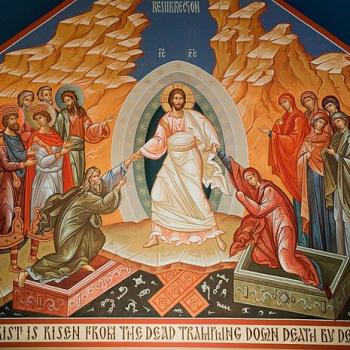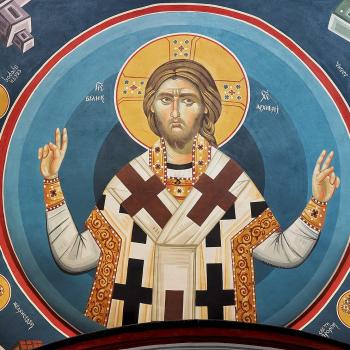
The inviolable dignity of life means that no one can ever deserve being put to death. If it is suggested that someone should be executed for something they have done, that means the dignity of life can be violated and overturned. To be prolife is to rejection such a violation of human dignity, which is why anyone who promotes such a violation of life, for any reason, cannot be said to be pro-life. It undermines the very postulate, the fundamental and inalienable dignity of the human person, by which the pro-life position is upheld. This is why an authentic pro-life position must be one that denies the death penalty; indeed, to properly be prolife, one does not look at easy cases and situations, but the difficult ones, and accept that despite such difficulty, the dignity of life remains inviolable so that there is nothing someone can do that ever deserves them to be executed.
It is true, the significance of the value of life itself, and the implications of that significance, have taken time for the church to properly come to the only possible conclusion: there is no justification for capital punishment and so it, not anyone’s life, should be put to an end. This, however, has been affirmed as the church’s proper position by Pope Francis’s revisions to the general Catechism:
Recourse to the death penalty on the part of legitimate authority, following a fair trial, was long considered an appropriate response to the gravity of certain crimes and an acceptable, albeit extreme, means of safeguarding the common good.
Today, however, there is an increasing awareness that the dignity of the person is not lost even after the commission of very serious crimes. In addition, a new understanding has emerged of the significance of penal sanctions imposed by the state. Lastly, more effective systems of detention have been developed, which ensure the due protection of citizens but, at the same time, do not definitively deprive the guilty of the possibility of redemption.
Consequently, the Church teaches, in the light of the Gospel, that “the death penalty is inadmissible because it is an attack on the inviolability and dignity of the person”, and she works with determination for its abolition worldwide.[1]
Pope Francis did not come to this conclusion independent from tradition, but rather, as the fulfillment of what had come before him. St. John Paul II declared the sacred, inviolable nature of life in Evangelium Vitae:
The sacredness of life gives rise to its inviolability, written from the beginning in man’s heart, in his conscience. The question: “What have you done?” (Gen 4:10), which God addresses to Cain after he has killed his brother Abel, interprets the experience of every person: in the depths of his conscience, man is always reminded of the inviolability of life-his own life and that of others-as something which does not belong to him, because it is the property and gift of God the Creator and Father. [2]
Despite killing Abel, God affirmed that Cain should not be killed; the murder of Abel was wrong because it represented humanity thinking it could find reasons to justify taking the life of someone else. To kill Cain would have suggested his ideology was correct. But God directed humanity away from the path of death. Slowly, God directed humanity away from its prideful attempt to judge whether or not someone is worthy of life. Since humanity was deeply committed to the power of bloodshed, God had to overcome this commitment to death by slowly revealing his true plan for humanity:
The commandment regarding the inviolability of human life reverberates at the heart of the “ten words” in the covenant of Sinai (cf. Ex 34:28). In the first place that commandment prohibits murder: “You shall not kill” (Ex 20:13); “do not slay the innocent and righteous” (Ex 23:7). But, as is brought out in Israel’s later legislation, it also prohibits all personal injury inflicted on another (cf. Ex 21:12-27). Of course we must recognize that in the Old Testament this sense of the value of life, though already quite marked, does not yet reach the refinement found in the Sermon on the Mount. This is apparent in some aspects of the current penal legislation, which provided for severe forms of corporal punishment and even the death penalty. But the overall message, which the New Testament will bring to perfection, is a forceful appeal for respect for the inviolability of physical life and the integrity of the person. It culminates in the positive commandment which obliges us to be responsible for our neighbour as for ourselves: “You shall love your neighbour as yourself” (Lev 19:18). [3]
To help Christians reawaken to this sense of the dignity of life, St. John Paul II explained that direct, voluntary killing of innocents must always be condemned:
Therefore, by the authority which Christ conferred upon Peter and his Successors, and in communion with the Bishops of the Catholic Church, I confirm that the direct and voluntary killing of an innocent human being is always gravely immoral. This doctrine, based upon that unwritten law which man, in the light of reason, finds in his own heart (cf. Rom 2:14-15), is reaffirmed by Sacred Scripture, transmitted by the Tradition of the Church and taught by the ordinary and universal Magisterium. [4]
With the kind of mistakes possible in relation to the death penalty, where innocents can be killed by poor judgments, this alone means that capital punishment must be put to an end. For accepting the death of even one innocent person as collateral damage demonstrates it is not justice which is being pursued. But, of course, this is not the only reason why capital punishment must be abolished: it is only an argument showing the fundamental flaw of those who try to claim some sort of justice in the act of killing those they claim are guilty. That they are willing to accept the death of innocents for their bloodlust indicates they have already violated the dignity of life.
Despite St. John Paul II’s clear indication that he wanted the abolition of the death penalty throughout the world, many tried to find loopholes in what he taught to justify and approve its use. Without surprise, such adherents of death ignored Pope Benedict XVI when he also advocated for the end of the death penalty:
This pastoral activity is a real service that the Church offers to society, and it is one that the state should support for the sake of the common good. Together with the Synod members, I draw the attention of society’s leaders to the need to make every effort to eliminate the death penalty and to reform the penal system in a way that ensures respect for the prisoners’ human dignity. Pastoral workers have the task of studying and recommending restorative justice as a means and a process for promoting reconciliation, justice and peace, and the return of victims and offenders to the community.[5]
Pope Francis, therefore, in rejecting the death penalty, pointed out it is a failure of society as they embrace evil, becoming worse than those they execute by doing so:
For a constitutional state the death penalty represents a failure, because it obliges the State to kill in the name of justice. Dostoyevsky wrote: “To kill a murderer is a punishment incomparably worse than the crime itself. Murder by legal sentence is immeasurably more terrible than murder by a criminal”. Justice is never reached by killing a human being.[6]
Many American Catholics, hearing the pleas from Rome, affirmed with St. John Paul II (and his successors) the dignity of life, and with it, the denunciation of capital punishment, but also, other violations of the dignity of life such as sexism and racism. John Paul II was pleased with such people and he indicated it in his audiences:
I am pleased to add that I found American Catholics very concerned and committed to the defence of life and the family, inseparable values which are a great challenge for the present and future of humanity. In a certain sense, my journey was a great appeal to America to accept the Gospel of life and the family in order to reject and combat any form of violence against the human person, from conception to natural death, with moral consistency. No to abortion and to euthanasia; enough of the unnecessary recourse to the death penalty; no to racism and to the exploitation of children, women and indigenous peoples; put an end to the arms trade, to drug trafficking and to the destruction of the environmental patrimony![7]
Why, then, do we find Catholics who have no problem with racism, sexism, or capital punishment, when all of them have been rejected as grave offenses to the dignity of the human person? How can some of them dare call themselves prolife when their rejection of human dignity, and with it, the inviolable dignity of life itself, allows them to promote and indeed rejoice in bloodshed? How can someone like Attorney General William Barr promote the death penalty? Since the law did not require executions, as they had ceased for over a decade, it cannot be said that William Barr was just following the law (though who would accept such an argument if someone lived in China and enforced their one-child policy?). It is a demonstration that the Trump administration, and with it William Barr, holds no sense of the dignity of life. Who will speak out? Will Barr’s bishop do anything in regards to Barr’s violation of Catholic teaching? Surely, the more the Trump administration demonstrates its disdain for the dignity of life, the greater the necessity for the church and its leaders do more than speak out, but act, lest their complacency will be judged against them in the future, just as the complacency of many church officials in Nazi Germany now stain the church’s history with their shame.
[1] Pope Francis, “New Revision of Number 2267 of the Catechism of the Catholic Church.” Vatican translation (02-08-2018).
[2] St. John Paul II, Evangelium Vitae. Vatican Translation. ¶40.
[3] St. John Paul II, Evangelium Vitae. Vatican Translation. ¶40.
[4] St. John Paul II, Evangelium Vitae. Vatican Translation. ¶57.
[5] Pope Benedict XVI, “Post Synodical Apostolic Exhortation Africae Munus,” ¶83.
[6] Pope Francis, “Letter to the International Commission Against the Death Penalty” (3-20-2015).
[7] St. John Paul II, General Audience Feb. 10, 1999. ¶4.
Stay in touch! Like A Little Bit of Nothing on Facebook.
If you liked what you read, please consider sharing it with your friends and family!

















